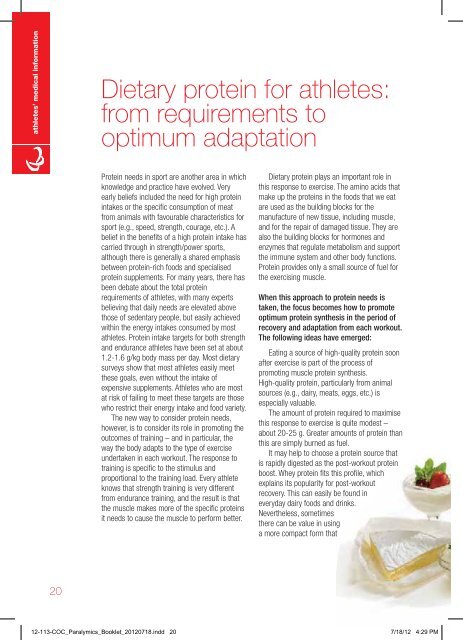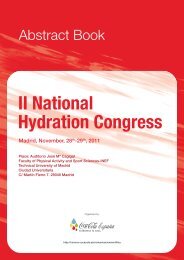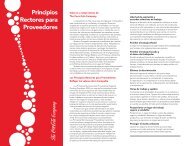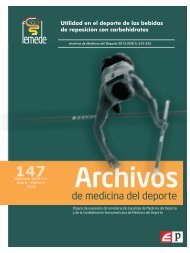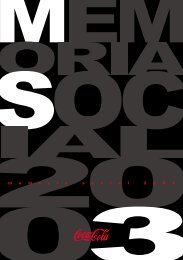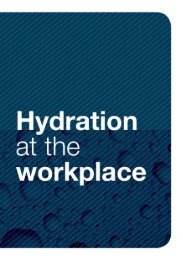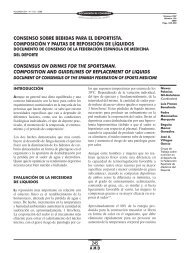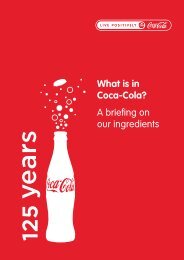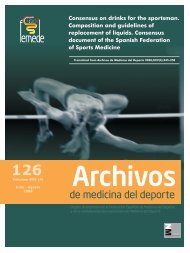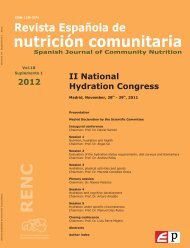athletes' medical information - Coca-Cola
athletes' medical information - Coca-Cola
athletes' medical information - Coca-Cola
Create successful ePaper yourself
Turn your PDF publications into a flip-book with our unique Google optimized e-Paper software.
athletes’ <strong>medical</strong> <strong>information</strong><br />
Dietary protein for athletes:<br />
from requirements to<br />
optimum adaptation<br />
Protein needs in sport are another area in which<br />
knowledge and practice have evolved. Very<br />
early beliefs included the need for high protein<br />
intakes or the specific consumption of meat<br />
from animals with favourable characteristics for<br />
sport (e.g., speed, strength, courage, etc.). A<br />
belief in the benefits of a high protein intake has<br />
carried through in strength/power sports,<br />
although there is generally a shared emphasis<br />
between protein-rich foods and specialised<br />
protein supplements. For many years, there has<br />
been debate about the total protein<br />
requirements of athletes, with many experts<br />
believing that daily needs are elevated above<br />
those of sedentary people, but easily achieved<br />
within the energy intakes consumed by most<br />
athletes. Protein intake targets for both strength<br />
and endurance athletes have been set at about<br />
1.2-1.6 g/kg body mass per day. Most dietary<br />
surveys show that most athletes easily meet<br />
these goals, even without the intake of<br />
expensive supplements. Athletes who are most<br />
at risk of failing to meet these targets are those<br />
who restrict their energy intake and food variety.<br />
The new way to consider protein needs,<br />
however, is to consider its role in promoting the<br />
outcomes of training – and in particular, the<br />
way the body adapts to the type of exercise<br />
undertaken in each workout. The response to<br />
training is specific to the stimulus and<br />
proportional to the training load. Every athlete<br />
knows that strength training is very different<br />
from endurance training, and the result is that<br />
the muscle makes more of the specific proteins<br />
it needs to cause the muscle to perform better.<br />
Dietary protein plays an important role in<br />
this response to exercise. The amino acids that<br />
make up the proteins in the foods that we eat<br />
are used as the building blocks for the<br />
manufacture of new tissue, including muscle,<br />
and for the repair of damaged tissue. They are<br />
also the building blocks for hormones and<br />
enzymes that regulate metabolism and support<br />
the immune system and other body functions.<br />
Protein provides only a small source of fuel for<br />
the exercising muscle.<br />
When this approach to protein needs is<br />
taken, the focus becomes how to promote<br />
optimum protein synthesis in the period of<br />
recovery and adaptation from each workout.<br />
The following ideas have emerged:<br />
Eating a source of high-quality protein soon<br />
after exercise is part of the process of<br />
promoting muscle protein synthesis.<br />
High-quality protein, particularly from animal<br />
sources (e.g., dairy, meats, eggs, etc.) is<br />
especially valuable.<br />
The amount of protein required to maximise<br />
this response to exercise is quite modest –<br />
about 20-25 g. Greater amounts of protein than<br />
this are simply burned as fuel.<br />
It may help to choose a protein source that<br />
is rapidly digested as the post-workout protein<br />
boost. Whey protein fits this profile, which<br />
explains its popularity for post-workout<br />
recovery. This can easily be found in<br />
everyday dairy foods and drinks.<br />
Nevertheless, sometimes<br />
there can be value in using<br />
a more compact form that<br />
20<br />
12-113-COC_Paralymics_Booklet_20120718.indd 20<br />
7/18/12 4:29 PM


